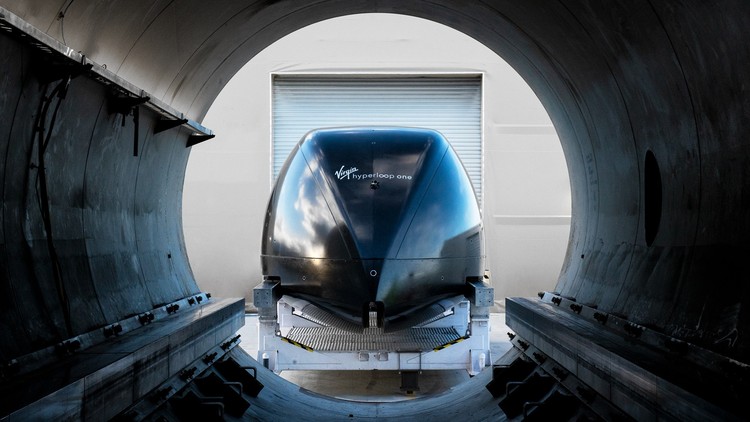
Between advances in autonomous technology and urban population growth, transit is being reimagined on the street and in the air. From public transit transforming to more user-centric mobility services, to rethinking regulatory and organizational status quos, advances in technology are expanding transit opportunities in cities around the world.

As BIG identified when looking at the evolution of transportation, there have been new innovations and shifts in the status quo every 50 to 70 years throughout the last two centuries. From ships and trains to automobiles and airplanes, these advances have changed the way we communicate, trade and connect to one another. Underpinning this conversation is the topic of autonomous mobility, where technologies like the VAL system and driverless trains account for nearly 1 billion passengers annually in Europe.

Today, there is a lot of talk about the Hyperloop systems, with Virgin Hyperloop One and HyperloopTT emerging as the leading teams rethinking transportation. The implications are dramatic, where our current ideas and associations of cities, geography and resources will radically change. At the same time, companies like Uber and Volocopter are looking to the sky to design and develop the world's first vertiport and air taxi hubs around the world. Trying to anticipate the future of mobility, these companies believe the Third Dimension will open up new possibilities for disrupting transit.
Looking at ArchDaily’s 2019 trends, the interest in Public Transport grew 206% YoY, and Mobility went up over 143% YoY, an increase over private means of transport. The main points of interest were self-driving cars (+160% YoY) and electric cars (+177% YoY). These represent a small segment of a larger movement. Whether rethinking bike sharing as a form of mass transit, or hoping to bring back the infamous straddling bus of 2016, cities and designers are reconsidering how people move today. Companies are already bringing these transit systems and technologies to life, and over the next few years, mobility, public transit and movement will be redefined.
Luxembourg Becomes First Country to Make All Public Transit Free

Luxembourg is set to become the world's first country to make all of its public transportation free. The newly re-elected prime minister Xavier Bettel and the coalition government have announced that they will lift all fares on trains, trams and buses next summer. Taking aim at long commutes and the country’s carbon footprint, the new move hopes to alleviate some of the worst traffic congestion in the world. Landlocked by Belgium, Germany and France, Luxembourg has more than 400,000 commuters travelling in to work from neighboring countries. This year, Luxembourg started offering free transportation to everyone under the age of 20. Secondary school students have also been able to ride free shuttles between school and home. Luxembourg currently has the highest number of cars for its population in the European Union.
India Approves Passenger Hyperloop System

The Government of Maharashtra has deemed Virgin Hyperloop One a public infrastructure project, setting it up to become one of the first hyperloop projects in the world. The announcement brings the hyperloop transportation system in India closer to reality, recognizing hyperloop technology alongside other more traditional forms of mass transit. Dubbed the Pune-Mumbai Hyperloop, the project will link central Pune to Mumbai in under 35 minutes, as opposed to the current 3.5+ hours by road.
Uber Flying “Skyports” Coming to a City Near You

Uber has unveiled images of its vision for the future of its revolutionary ride-sharing business. “Uber Elevate” seeks to herald in a new era of “urban aerial ridesharing” beginning in 2023 with customers able to hail a flight on-demand. As reported by The Verge, this future vision has seen Uber hold a competition inviting architecture firms to speculate on the “Uber Air Skyports” of tomorrow. The Skyports comprise a system of launchpads and landing sites throughout the urban landscape hosting a futuristic “flying taxi” service. At the company’s second annual Elevate conference in Los Angeles in May 2018, Uber revealed the winning designs from six firms, capable of transporting more than 4000 passengers per hour.
World's First Commercial Hyperloop Coming to Abu Dhabi in 2020

Hyperloop Transportation Technologies (HyperloopTT) has released details of their plan to create the world’s first commercial Hyperloop system in Abu Dhabi. Situated on the border between Abu Dhabi and Dubai, in close proximity to both the Al Maktoum International Airport and World Expo 2020 site, the HyperloopTT will begin with the construction of six miles (ten kilometers) of infrastructure, with future development potentially creating a commercial Hyperloop network across the United Arab Emirates and beyond. While the concept of magnetically-levitating Hyperloop has existed for decades, the ability to construct an operational system has only emerged in recent years, spurred in 2013 by Elon Musk’s opening of intellectual property to any company which could develop the technology. If implemented and developed, the Hyperloop will connect people and goods at extremely high speeds, potentially up to the speed of sound (760mph), thus tackling key challenges facing the built environment, including overpopulation, traffic congestion, and pollution.
World's First International Cable Car Connecting China and Russia

UNStudio has won the competition to design the world's first cross-border cable car to carry passengers across the Amur River connecting Russia and China. The Cable Car Terminal is designed as an expression of the historic connection between the two cities of Blagoveshchensk and Heihe. The new cable car line aims to become an engine for creating social connections between the two cultures and will connect the cities in less than 10 minutes. Comprising 2 lines and 4 cabins - each with a capacity of 60 passengers and extra space for luggage – journey time will be approximately 7:30 mins, while actual travel time will be 3:30 mins.


